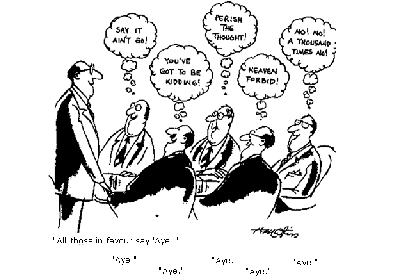On January 28, 1986, the space shuttle Challenger blasted off. Seventy-three seconds later, millions of people watched as the rocket disintegrated in a fiery explosion, and the capsule plunged back to Earth. The death of all seven crew members, particularly teacher Christa McAuliffe, shocked the world. As we learned in the months that followed, the tragedy could and should have been avoided. The root cause of the disaster was something known as Groupthink.
Groupthink did not exist before 1972! Irving Janis, a social psychologist focusing on the political arena, was puzzled by the inability of otherwise very clever and intelligent people to make sound decisions, and in fact their tendency to make ones that sometimes created disastrous results. His answer was a condition he termed Groupthink.
What is Groupthink and how to spot it
Groupthink is a mode of thinking that people engage in when they are deeply involved in a cohesive, task-centred group, when their need for unanimity supersedes the need to make a decision based on rational information. Groupthink can lead to bad judgments and decisions being made, and can also cause a group of decision makers to rationalise a poor decision after the fact. It’s a simple and totally inadequate way to deal with difficult issues.
While discord and conflict among individuals is one major pitfall among decision-makers, Groupthink is equally dangerous. Group cohesiveness is a good quality and something all groups need to strive for, but Groupthink takes this cohesiveness to the extreme. One client recently said to us, “It’s terrifying to see how people all line up behind the key influencers [in this team] without ever questioning the decision, or the basis on which the decision is being put forward”.
Groupthink happens frequently when a group is under pressure to make a decision. Ironically this happens in organisations at the most crucial time – often when strategic decisions need to be made to satisfy corporate leaders or shareholders. Hence the total incredulity often seen when strategy decisions are “communicated” down the line to those not on the decision-making body but closer to the facts!
- Do managers in your company succumb to groupthink?
- What effects has this had on your business success?
- What lessons have you learned?
For some top tips on how to avoid Groupthink, have a look at a previous blog post from last December.
